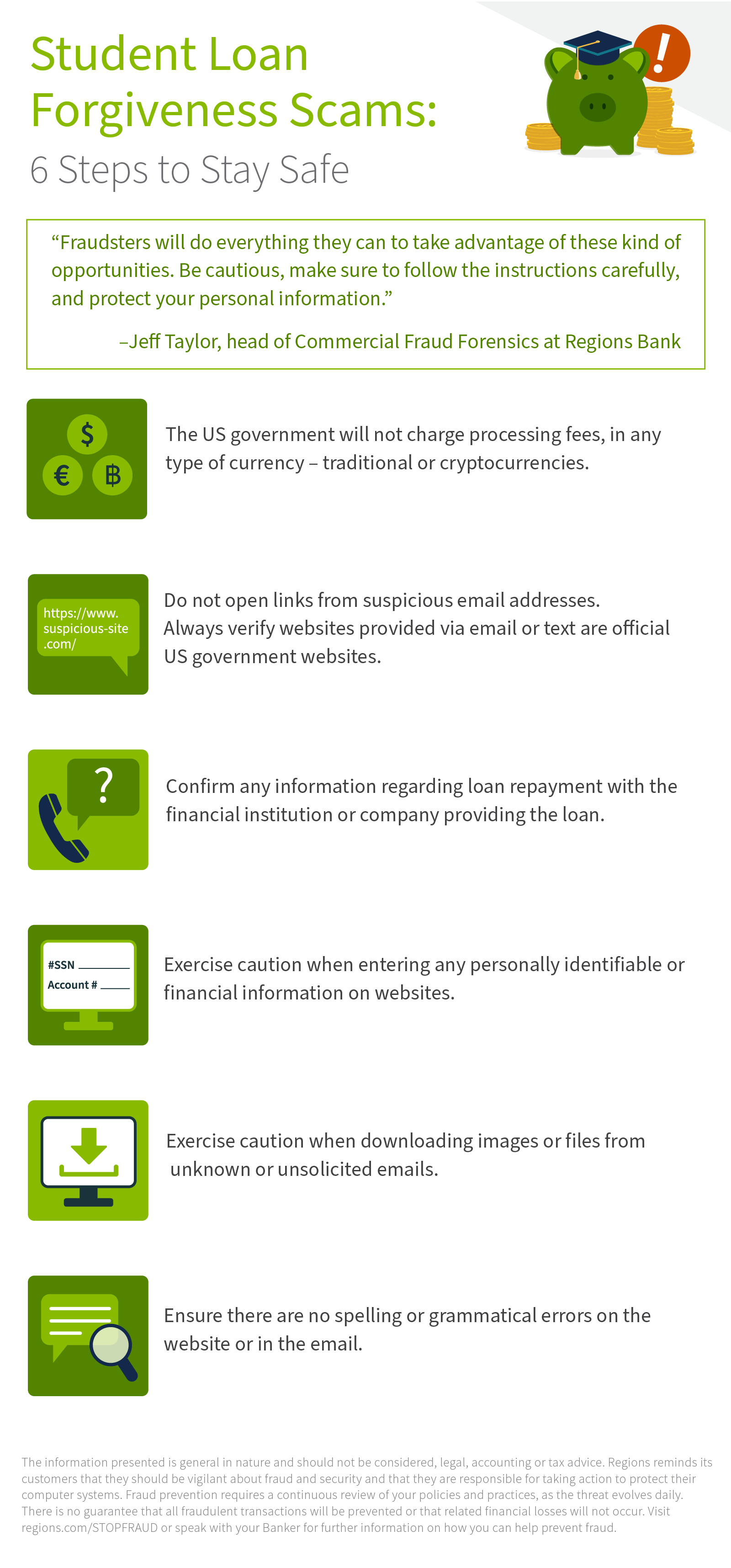There’s now help for borrowers through the White House’s student loan forgiveness program.
Unfortunately, as Doing More Today warned at the onset of the announcement, there are bad actors who want to take your money and run.
With the White House application program now open, the FBI has issued a new warning concerning ongoing student forgiveness loan scams. (Processing the applications has been delayed after the 8th Circuit Court of Appeals issued a temporary stay).
“Fraudsters will do everything they can to take advantage of these kind of opportunities,” said Jeff Taylor, head of Commercial Fraud Forensics at Regions Bank. “Be cautious, make sure to follow the instructions carefully, and protect your personal information.”
While the program requires you to apply directly, cybercriminals and fraudsters may offer help with student loan forgiveness through various phone, email and text messages.
Just remember, neither your bank nor the federal government will offer help unsolicited.
So look for these three signs of student loan forgiveness scams from the FBI:
- Scammers send electronic communications, offering help for the student loan forgiveness through an application process. For example, a text with a link that, when clicked, requests personal information.
- Websites offering immediate student loan forgiveness asking for information, such as account numbers, credit card information, digital wallet addresses or peer money service account information to process an application fee or complete the application process.
- Scammers may call, posing as representatives of a bank or even the Department of Education. They then request personal and financial information to begin the process for loan repayment.
Recognizing the potential fraud is a good first step.
But the FBI also offers 6 tips to protect yourself from student loan forgiveness scams:

But, if all else fails and you do fall victim of a student loan forgiveness scam, the FBI recommends taking these immediate steps:
- Report to the FBI Internet Crime Complaint Center at IC3.gov as quickly as possible.
- Report the activity to the online payment service used for the financial transaction.
- Contact your financial institution immediately to stop or reverse the transactions. Ask your financial institution to contact the corresponding financial institution where the fraudulent or suspicious transfer was sent.
- Preserve any transaction information, including prepaid cards and banking records and all telephone, text, or email communications.
- Monitor your financial accounts and credit reports for fraudulent activity.
- Report to the Department of Education at https://studentaid.gov/feedback-center and the Consumer Financial Protection Bureau (CFPB) at https://www.consumerfinance.gov/complaint/.
“Our team of Regions professionals focuses daily on fighting fraud, and the best way to do that is to make sure our customers are aware of the latest scams,” said Kimberly Reece of the Regions Fraud Strategy Customer Experience Team. “Student loan forgiveness scams are the latest examples. But by being aware of the threats you can protect yourself, your family and your financial future.”
Our team of Regions professionals focuses daily on fighting fraud, and the best way to do that is to make sure our customers are aware of the latest scams.
Kimberly Reece of the Regions Fraud Strategy Customer Experience Team
Related Articles from Doing More Today:
The information presented is general in nature and should not be considered, legal, accounting or tax advice. Regions reminds its customers that they should be vigilant about fraud and security and that they are responsible for taking action to protect their computer systems. Fraud prevention requires a continuous review of your policies and practices, as the threat evolves daily. There is no guarantee that all fraudulent transactions will be prevented or that related financial losses will not occur. Visit regions.com/STOPFRAUD or speak with your Banker for further information on how you can help prevent fraud.